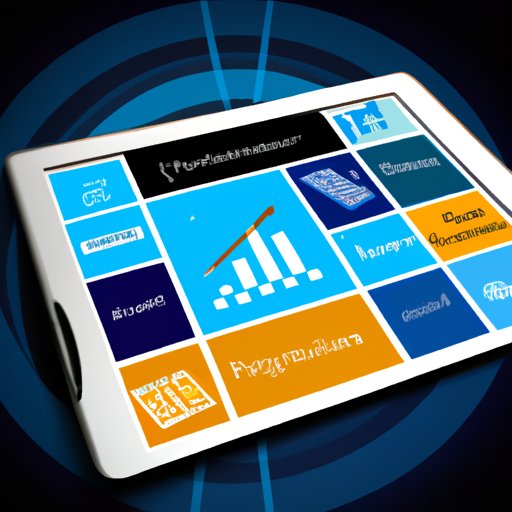Introduction
When it comes to managing your finances, there’s no one-size-fits-all approach. Everyone has different needs, goals, and resources, so it’s important to find a plan that works for you. Holistic financial planning is a comprehensive approach that takes into account all aspects of your financial life, from budgeting and investments to insurance and estate planning. In this article, we’ll explore what holistic financial planning is and how it works, as well as provide tips for making the most of your plan.
What is Holistic Financial Planning and How Does it Work?
Holistic financial planning is an all-encompassing approach to financial management. It looks at all aspects of your financial life, including budgeting, investments, insurance, taxes, and estate planning. By taking a holistic view of your finances, you can create a plan that helps you reach your short- and long-term goals.
Exploring the Different Components
Holistic financial planning includes many different components, each of which plays an important role in helping you achieve your goals:
Financial Goals
The first step in holistic financial planning is to set financial goals. These can be short-term or long-term, such as saving for retirement or buying a house. Your goals should be realistic and achievable, and they should reflect your values and priorities.
Budgeting
Once you have identified your goals, it’s time to create a budget. This will help you understand where your money is going and identify areas where you can save. A budget should also include a plan for achieving your goals, such as setting aside a certain amount of money each month.
Investment Strategies
Investments can be a powerful tool for reaching your financial goals. When creating an investment strategy, it’s important to consider your risk tolerance and time horizon. You may want to consult a financial advisor to ensure you’re making the right choices.
Insurance
Insurance is an essential part of any holistic financial plan. Different types of insurance, such as health, life, and disability, can help protect you and your family in the event of an unexpected illness or accident. It’s important to review your coverage regularly to make sure it meets your needs.
Tax Planning
Taxes are an unavoidable part of life, but you can use tax planning to minimize the amount you owe. This includes strategies such as claiming deductions and credits, taking advantage of tax-advantaged accounts, and considering the tax implications of any major financial decisions.
Estate Planning
Estate planning is an important component of holistic financial planning. It involves creating a plan for managing your assets after you die, including distributing them to your heirs and ensuring your wishes are carried out. This can involve creating a will, establishing trusts, and setting up power of attorney.
Analyzing Your Current Situation
Before you begin creating a holistic financial plan, it’s important to take a step back and assess your current situation. This includes looking at your income, expenses, debts, assets, and liabilities. This will give you a better understanding of your financial picture and help you identify areas where you can make changes.
The Basics of Holistic Financial Planning
Once you have a good understanding of your current financial situation, it’s time to create a plan. Here are some of the basics of holistic financial planning:
Setting Short- and Long-Term Goals
The first step is to set both short- and long-term goals. These should be specific, measurable, achievable, relevant, and time-based. Your goals should also reflect your values and priorities, and they should be realistic and achievable.
Creating a Plan to Achieve Your Goals
Once you have identified your goals, it’s time to create a plan for achieving them. This should include a budget, an investment strategy, and a plan for managing debt. It should also include steps for tracking your progress and adjusting your plan as needed.
Developing an Investment Strategy
An investment strategy is an important part of any holistic financial plan. It should include diversifying your investments, understanding your risk tolerance, and researching different options. You may want to consult a financial advisor to ensure you’re making the right choices.
Establishing an Emergency Fund
An emergency fund is a must-have for any financial plan. This should be a savings account with enough money to cover three to six months of living expenses. This will help you prepare for unexpected costs, such as medical bills or home repairs.
Understanding the Tax Implications
It’s important to understand the tax implications of any financial decisions you make. This includes taking advantage of tax-advantaged accounts, such as 401(k)s and IRAs, as well as claiming deductions and credits. Working with a tax professional can help you maximize your savings.
Reviewing Your Plan Regularly
Your financial plan should be reviewed regularly to ensure it’s still meeting your needs. This includes assessing your goals, evaluating your investments, and monitoring your progress. It’s also important to adjust your plan as your life changes, such as when you get married or start a new job.

Leveraging Technology to Make Holistic Financial Planning Easier
Technology has made it easier than ever to manage your finances. There are now a variety of automated tools and online platforms available to help you track your goals and monitor your progress. Here are some of the ways you can use technology to make holistic financial planning easier:
Automated Tools for Goal Tracking
There are a number of tools available to help you track your financial goals. These include apps for budgeting, investing, and goal setting, as well as websites that can help you stay on top of your progress. Automated tools can save you time and make it easier to stay on track.
Online Investment Platforms
Online investment platforms make it easy to invest in stocks, bonds, and other assets. Many of these platforms offer low fees, intuitive user interfaces, and educational resources to help you make smart decisions. They can also help you diversify your portfolio and monitor your investments.
Mobile Apps for Financial Management
There are also a variety of mobile apps available for financial management. These apps can help you track your spending, pay bills, and set up automatic transfers between accounts. They can also help you find discounts, compare prices, and find deals.

Tips for Effective Holistic Financial Planning
While technology can make holistic financial planning easier, it’s important to keep a few key points in mind:
Start Early
The earlier you start planning for your financial future, the better. This gives you more time to save, invest, and build wealth. It also gives you more time to adjust your plan if needed.
Know Your Risk Tolerance
It’s important to understand your risk tolerance when creating an investment strategy. Knowing how much risk you’re comfortable taking will help you make the right decisions and avoid investments that could put your money at risk.
Consult a Professional
Working with a financial advisor or tax professional can help you make the most of your plan. They can provide advice on investments, taxes, and estate planning, as well as help you navigate any changes in your life.
Take a Long-Term Approach
When creating your plan, it’s important to take a long-term approach. This means focusing on building wealth over time and avoiding risky investments that could put your money at risk. It also means staying disciplined and sticking to your plan even when times get tough.
Monitor Your Progress
Finally, it’s important to monitor your progress regularly. This includes reviewing your goals, assessing your investments, and tracking your spending. It also means adjusting your plan as needed to ensure you’re on track to reach your goals.
Conclusion
Holistic financial planning is a comprehensive approach to managing your finances. It involves setting goals, creating a budget, developing an investment strategy, and understanding the tax implications of your decisions. Leveraging technology can make holistic financial planning easier, but it’s important to start early, know your risk tolerance, and consult a professional.
By following these tips, you can create a plan that helps you reach your short- and long-term goals. You’ll also be better prepared for any unexpected events that come your way.
(Note: Is this article not meeting your expectations? Do you have knowledge or insights to share? Unlock new opportunities and expand your reach by joining our authors team. Click Registration to join us and share your expertise with our readers.)
